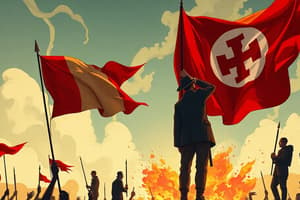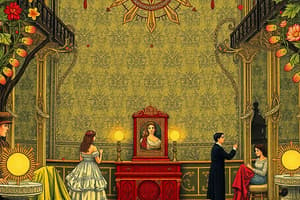Podcast
Questions and Answers
Who was the son of a socialist blacksmith and a teacher, rejected socialism, focused on nationalism, and was a fiery and charismatic speaker?
Who was the son of a socialist blacksmith and a teacher, rejected socialism, focused on nationalism, and was a fiery and charismatic speaker?
Benito Mussolini
What were the party militants who rejected the democratic process in favor of violent action called?
What were the party militants who rejected the democratic process in favor of violent action called?
black shirts
In the _____ of _____, tens of thousands of Fascists swarmed towards the capital.
In the _____ of _____, tens of thousands of Fascists swarmed towards the capital.
March, Rome
What form of government attempts to regulate every aspect of the lives of its citizens and was built by Mussolini?
What form of government attempts to regulate every aspect of the lives of its citizens and was built by Mussolini?
What is any centralized, authoritarian government that is not communist and whose policies glorify the state over the individual?
What is any centralized, authoritarian government that is not communist and whose policies glorify the state over the individual?
How did postwar disillusionment contribute to Mussolini's rise?
How did postwar disillusionment contribute to Mussolini's rise?
How did the Fascist party transform Italy's government and economy?
How did the Fascist party transform Italy's government and economy?
What are the similarities between fascism and communism?
What are the similarities between fascism and communism?
Following World War I, Italy was in chaos: Peasants seized _____. Workers went on ____ or seized factories. Returning veterans faced unemployment. _____ declined. _____ rose.
Following World War I, Italy was in chaos: Peasants seized _____. Workers went on ____ or seized factories. Returning veterans faced unemployment. _____ declined. _____ rose.
By 1925, Mussolini had taken the title '____ _____' and ruled Italy as a _____.
By 1925, Mussolini had taken the title '____ _____' and ruled Italy as a _____.
What did Mussolini preserve while taking control of the state?
What did Mussolini preserve while taking control of the state?
For many in Italy, what political ideology promised a strong stable government and an end to the political feuding?
For many in Italy, what political ideology promised a strong stable government and an end to the political feuding?
How and why did fascism rise in Italy?
How and why did fascism rise in Italy?
After World War I, _____ faced economic chaos and political corruption. The country was ripe for an ambitious strongman to rise to _____.
After World War I, _____ faced economic chaos and political corruption. The country was ripe for an ambitious strongman to rise to _____.
When was Mussolini asked to become Italy's prime minister?
When was Mussolini asked to become Italy's prime minister?
Describe the similarities and differences between fascism and a totalitarian state.
Describe the similarities and differences between fascism and a totalitarian state.
How did the Fascist party transform Italy's government and economy?
How did the Fascist party transform Italy's government and economy?
What role did women play under fascism?
What role did women play under fascism?
What are the roots of fascism?
What are the roots of fascism?
What type of government has representatives of business, labor, government, and the Fascist party controlling the state?
What type of government has representatives of business, labor, government, and the Fascist party controlling the state?
Flashcards are hidden until you start studying
Study Notes
Benito Mussolini
- Born to a socialist blacksmith and a teacher, he rejected socialism in favor of nationalism.
- Renowned as a fiery and charismatic speaker, he played a pivotal role in Italy's political landscape.
Black Shirts
- Party militants committed to aggressive action, rejecting democratic processes in favor of violence.
March on Rome
- A significant event during which tens of thousands of Fascists marched towards the Italian capital, demonstrating their strength.
Totalitarian State
- Established by Mussolini, characterized by a one-party dictatorship regulating all aspects of citizens' lives.
Fascism
- Centralized authoritarian government promoting state supremacy over individual rights; not rooted in communism.
Postwar Disillusionment
- Discontent after World War I unified Italians, fueling a desire for a more effective government despite its aggressive nature.
Fascist Transformation
- Changed Italy's government to a terror-driven dictatorship, centralized economic control, and altered domestic life.
Similarities Between Fascism and Communism
- Both ideologies emphasize loyalty to government or leader, use terror as a tool, and promote social change.
Italy Post World War I
- Chaos ensued with peasants seizing land, workers striking, rising unemployment among veterans, and government fragmentation.
Mussolini's Rule
- By 1925, he claimed the title "The Leader" and established a dictatorship, promoting stability amidst political turmoil.
Economic Policy
- Mussolini maintained capitalism while favoring the wealthy, often at the expense of the working class.
Appeal of Fascism
- Many Italians viewed fascism as a solution to achieve a strong, stable government and resolve political strife.
Rise of Fascism
- Mussolini's intense nationalism attracted support from upper and middle classes and veterans, leading to economic stability.
Italy's Post-War Conditions
- The nation experienced economic chaos and political corruption, creating a vacuum for a strong leader to emerge.
Appointment as Prime Minister
- Mussolini was invited to head Italy's government following the March on Rome, solidifying his power.
Fascism vs. Totalitarianism
- Fascism embodies extreme nationalism and may not necessarily require totalitarian control, while a true totalitarian state seeks to dominate every aspect of life.
Economic Control under Fascism
- Mussolini's regime retained capitalism but favored industrial leaders, suppressed opposition, and manipulated electoral processes.
Role of Women in Fascism
- Women were encouraged to make sacrifices for the nation, rewarded with honors for large families.
Roots of Fascism
- Characterized by extreme nationalism, glorified violence, obedient loyalty to the state, anti-democratic sentiments, and expansionist policies.
Corporate Government
- This form of governance involved collaboration between representatives of business, labor, government, and the fascist party, controlling state functions.
Studying That Suits You
Use AI to generate personalized quizzes and flashcards to suit your learning preferences.




